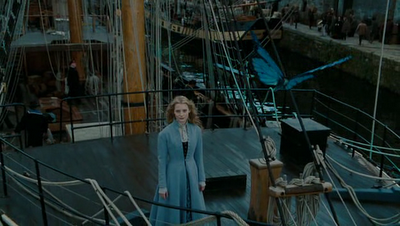
Yesterday I saw Tim Burton's Alice in Wonderland. Although this movie too will not be a memorable one, the truth is I felt an instant connection with the somewhat-older-and-discovering-herself Alice so I started doing some research on Lewis Carroll's original character to see whether he had made similar implications in his books. I should state that I was never a big fan of her adventures probably because I was introduced to the tale at a very early age which -the way I see it- is plainly wrong! I wanted so much to like that book my parents gave me, but it was all gibberish and I felt frustrated.
Now, what I discovered immediately about the book is that, contrary to the common belief that Alice is a fairytale for small kids, it is actually a fairytale for geeks! I mean, it is so full of mathematical and logical implications that makes you wonder "whatever do they find in Star Wars?" I will just excerpt a part from this article because it is not my intention to put a list of all the symbolisms here:
Now, what I discovered immediately about the book is that, contrary to the common belief that Alice is a fairytale for small kids, it is actually a fairytale for geeks! I mean, it is so full of mathematical and logical implications that makes you wonder "whatever do they find in Star Wars?" I will just excerpt a part from this article because it is not my intention to put a list of all the symbolisms here:
[...] Then there is the passage in which the White Knight proposes to comfort Alice by singing her a song:
"Is it very long?" Alice asked, for she had heard a good deal of poetry that day.
"It's long," said the Knight, "but it's very, very beautiful. Everybody that hears me sing it--either it brings the tears into their eyes, or else--"
"Or else what?" said Alice, for the Knight had made a sudden pause.
"Or else it doesn't, you know. The name of the song is called 'Haddock's Eyes'."
"Oh, that's the name of the song, is it?" Alice said, trying to feel interested.
"No, you don't understand," the Knight said, looking a little vexed. "That's what the name is called. The name really is 'The Aged Aged Man'."
"Then I ought to have said 'That's what the song is called?'" Alice corrected herself.
"No, you oughtn't: that's quite another thing! The song is called 'Ways and Means': but that's only what it's called, you know!"
"Well, what is the song, then?" said Alice, who was by this time completely bewildered.
"I was coming to that," the Knight said. "The song really is 'A-sitting on a Gate': and the tune's my own invention."
Now that is formal logic served up with an apple in its mouth! Those familiar with programming computers in higher-level languages will see there a clear delineation of the difference between a datum, the symbolic name of that datum, the address at which the datum is stored, and the symbolic name of that address. Philosophers will see "meta-languages" and the self-referential problems being side-stepped with them, an effort going back to the classical Greeks. The whole thing looks to the casual reader a total nonsense, but it's not: the song is A-sitting on a Gate; the song is called 'Ways and Means', but what it is called is not what its name is (as, for example, the once-popular song named "In Other Words" is usually called "Fly Me to the Moon"); the proper name of the song is 'The Aged Aged Man'; but--and here we go beyond commonplace usage but not at all beyond logic--the name of the song has its own nickname, 'Haddock's Eyes'. Confused? Carroll wasn't.
[...]
I really love this kind of mind exercises but the time I was at the age to be puzzled is long gone. They are really good for raising little geeks though, and I would be so grateful if I had this as a kid instead of the stripped off version of a fairytale with an annoying rabbit getting a little girl in trouble. All the hidden meanings are in Martin Gardner's The Annotated Alice that the article tried to convince me to read, and I would if I didn't have a ton of things to do before my life begins (or ends, depending on how you see it) in two month's time. Besides, after the invasion of Japanese Lollitas and Kerli, Alice is popping up everywhere. It's becoming a worn-out theme.
Comments
Post a Comment